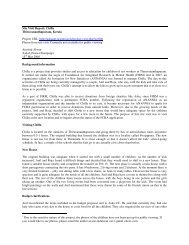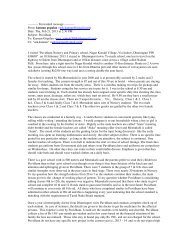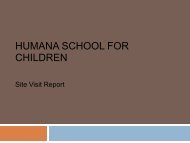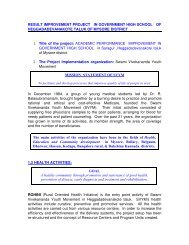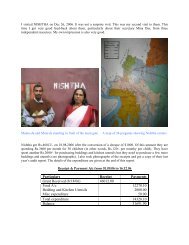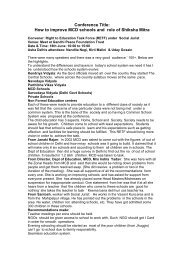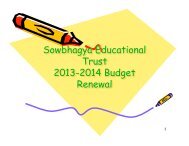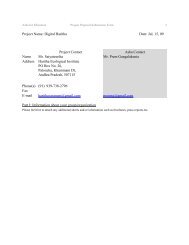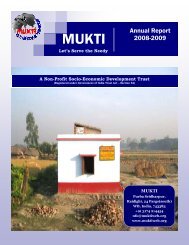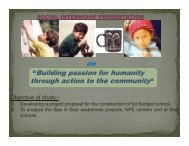ANNUAL REPORT 2002 - Asha for Education
ANNUAL REPORT 2002 - Asha for Education
ANNUAL REPORT 2002 - Asha for Education
Create successful ePaper yourself
Turn your PDF publications into a flip-book with our unique Google optimized e-Paper software.
<strong>Asha</strong> <strong>for</strong> education supports a large number of projects with varying focus on the <strong>for</strong>m ofeducation imparted. In addition to supporting projects that provide access to basiceducation <strong>for</strong> the underprivileged kids, <strong>Asha</strong> also supports projects that provide access toalternate education such as personal hygiene and self-esteem, sustainable agricultural life-style, andso on. In this section, we highlight four projects that were nominated <strong>for</strong> funding through the WorkAn Hour (WAH) campaign. The WAH campaign is <strong>Asha</strong>'s annual worldwide fund-raising event thatraises money to fund specific projects.Projects funded through Work An Hour in <strong>2002</strong>1. Adhikar $19,<strong>2002</strong>. Gyanganga $15,3003. Timbaktu Collective $25,7254. Urmul Jyothi $19,585Total Disbursed $92,641Projects in FocusAdhikar: ADHIKAR started its operation in the slums of Bhubaneswarin Orissa - a state in the Eastern part of India. Currently, its activities arespread over four districts namely Jagatsinghpur, Khurda, Nayagarh, Cuttack,and Nawaranghpur in Orissa.Funding from <strong>Asha</strong> through Work An Hour <strong>2002</strong> will help fifteen Non Formal <strong>Education</strong>(NFE) centers in 13 Gram Panchayats in Chandanhandi block of Nawrangpur district ofOrissa. This project will benefit approximately 420 children. This area is predominated bytribals and people from the lower castes, and has the lowest literacy level in the state. There aresound indications of community involvement such as: all teachers are local, most classes areconducted in the teacher's house or rooms dedicated by villagers, local community has beencontributing basic school supplies. However, the villages in which the NFE centers operate areextremely poor.The objectives of this project are to:1. Promote universal enrolment and retention of children of 6-14 years age group in theoperational area.2. Help improve the quality of education through relevance of curriculum, diversity inlearning activities and innovative methodologies and materials.3. Create a learning climate by involving local community, parents and <strong>for</strong>mal schoolteachers.4. Cater to the learning needs of children from socially and economicallyweaker sections of society.<strong>ANNUAL</strong><strong>REPORT</strong><strong>2002</strong>pg: 14



